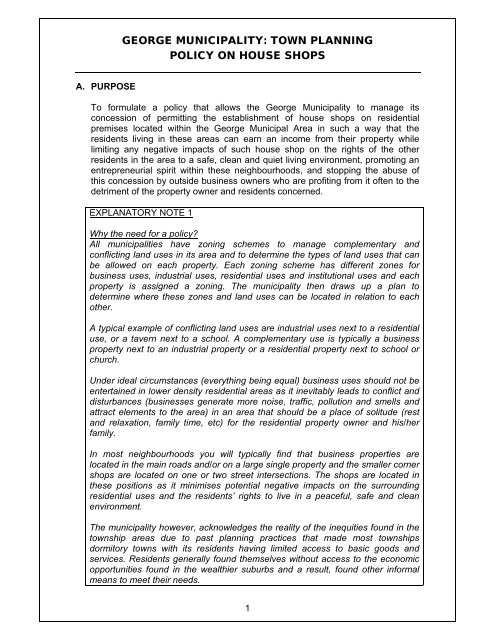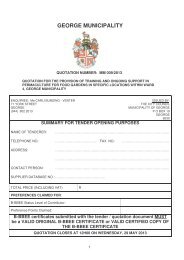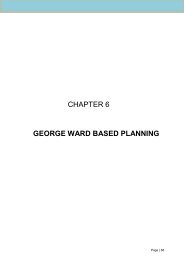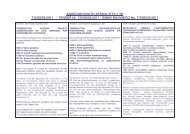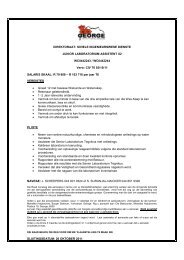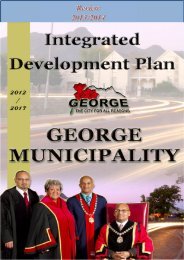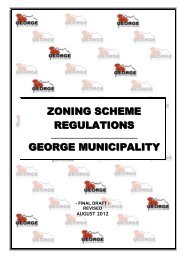george municipality: town planning policy on house shops
george municipality: town planning policy on house shops
george municipality: town planning policy on house shops
You also want an ePaper? Increase the reach of your titles
YUMPU automatically turns print PDFs into web optimized ePapers that Google loves.
GEORGE MUNICIPALITY: TOWN PLANNING<br />
POLICY ON HOUSE SHOPS<br />
A. PURPOSE<br />
To formulate a <str<strong>on</strong>g>policy</str<strong>on</strong>g> that allows the George Municipality to manage its<br />
c<strong>on</strong>cessi<strong>on</strong> of permitting the establishment of <strong>house</strong> <strong>shops</strong> <strong>on</strong> residential<br />
premises located within the George Municipal Area in such a way that the<br />
residents living in these areas can earn an income from their property while<br />
limiting any negative impacts of such <strong>house</strong> shop <strong>on</strong> the rights of the other<br />
residents in the area to a safe, clean and quiet living envir<strong>on</strong>ment, promoting an<br />
entrepreneurial spirit within these neighbourhoods, and stopping the abuse of<br />
this c<strong>on</strong>cessi<strong>on</strong> by outside business owners who are profiting from it often to the<br />
detriment of the property owner and residents c<strong>on</strong>cerned.<br />
EXPLANATORY NOTE 1<br />
Why the need for a <str<strong>on</strong>g>policy</str<strong>on</strong>g><br />
All municipalities have z<strong>on</strong>ing schemes to manage complementary and<br />
c<strong>on</strong>flicting land uses in its area and to determine the types of land uses that can<br />
be allowed <strong>on</strong> each property. Each z<strong>on</strong>ing scheme has different z<strong>on</strong>es for<br />
business uses, industrial uses, residential uses and instituti<strong>on</strong>al uses and each<br />
property is assigned a z<strong>on</strong>ing. The <str<strong>on</strong>g>municipality</str<strong>on</strong>g> then draws up a plan to<br />
determine where these z<strong>on</strong>es and land uses can be located in relati<strong>on</strong> to each<br />
other.<br />
A typical example of c<strong>on</strong>flicting land uses are industrial uses next to a residential<br />
use, or a tavern next to a school. A complementary use is typically a business<br />
property next to an industrial property or a residential property next to school or<br />
church.<br />
Under ideal circumstances (everything being equal) business uses should not be<br />
entertained in lower density residential areas as it inevitably leads to c<strong>on</strong>flict and<br />
disturbances (businesses generate more noise, traffic, polluti<strong>on</strong> and smells and<br />
attract elements to the area) in an area that should be a place of solitude (rest<br />
and relaxati<strong>on</strong>, family time, etc) for the residential property owner and his/her<br />
family.<br />
In most neighbourhoods you will typically find that business properties are<br />
located in the main roads and/or <strong>on</strong> a large single property and the smaller corner<br />
<strong>shops</strong> are located <strong>on</strong> <strong>on</strong>e or two street intersecti<strong>on</strong>s. The <strong>shops</strong> are located in<br />
these positi<strong>on</strong>s as it minimises potential negative impacts <strong>on</strong> the surrounding<br />
residential uses and the residents’ rights to live in a peaceful, safe and clean<br />
envir<strong>on</strong>ment.<br />
The <str<strong>on</strong>g>municipality</str<strong>on</strong>g> however, acknowledges the reality of the inequities found in the<br />
<str<strong>on</strong>g>town</str<strong>on</strong>g>ship areas due to past <str<strong>on</strong>g>planning</str<strong>on</strong>g> practices that made most <str<strong>on</strong>g>town</str<strong>on</strong>g>ships<br />
dormitory <str<strong>on</strong>g>town</str<strong>on</strong>g>s with its residents having limited access to basic goods and<br />
services. Residents generally found themselves without access to the ec<strong>on</strong>omic<br />
opportunities found in the wealthier suburbs and a result, found other informal<br />
means to meet their needs.<br />
1
It also acknowledges that the majority of the residents in the <str<strong>on</strong>g>town</str<strong>on</strong>g>ship areas are<br />
not by the ec<strong>on</strong>omic means to support themselves and that the <strong>on</strong>ly real asset<br />
they can use to generate an income for themselves is their property. As a result,<br />
you will find that many owners in these areas would typically rent rooms in their<br />
<strong>house</strong> or part of their property to backyarders, while others start vegetable<br />
gardens, and small and micro businesses from home. The types of businesses<br />
range from small fruit and vegetable and luxury (sweets, cool drinks and chips)<br />
stalls, small take-away stalls (typical braai stands) to your larger <strong>house</strong> <strong>shops</strong><br />
which sell a larger variety of goods and services.<br />
The proliferati<strong>on</strong> of <strong>house</strong> <strong>shops</strong> and other small businesses in the <str<strong>on</strong>g>town</str<strong>on</strong>g>ship<br />
areas is thus a resp<strong>on</strong>se to rectify the imbalances of the past and also to resp<strong>on</strong>d<br />
to the social needs and ec<strong>on</strong>omic demands of the community and the<br />
<str<strong>on</strong>g>municipality</str<strong>on</strong>g>, in resp<strong>on</strong>se to the need, has made a c<strong>on</strong>cessi<strong>on</strong> to allow these<br />
enterprises.<br />
However, in recent years, the c<strong>on</strong>cessi<strong>on</strong> to allow the establishment of <strong>house</strong><br />
<strong>shops</strong> in the <str<strong>on</strong>g>town</str<strong>on</strong>g>ship areas as a socio-ec<strong>on</strong>omic interventi<strong>on</strong> has been abused<br />
by formal business owners and other outside parties who take advantage of the<br />
<strong>house</strong> shop c<strong>on</strong>cept to establish formal businesses <strong>on</strong> these residential<br />
properties, often to the detriment of the property owner c<strong>on</strong>cerned. This activity is<br />
deemed to be in c<strong>on</strong>flict with the spirit in which the c<strong>on</strong>cessi<strong>on</strong> was originally<br />
afforded by the <str<strong>on</strong>g>municipality</str<strong>on</strong>g> and should therefore not be permitted.<br />
The purpose of this <str<strong>on</strong>g>policy</str<strong>on</strong>g> is thus to manage the allowance of these <strong>house</strong> <strong>shops</strong><br />
in such a way that it allows the residents living in the <str<strong>on</strong>g>town</str<strong>on</strong>g>ship areas to earn an<br />
income from their property without having a / limiting its negative impact <strong>on</strong> the<br />
rights of the other residents in the area to a safe, clean and quiet living<br />
envir<strong>on</strong>ment, while promoting an entrepreneurial spirit within these<br />
neighbourhoods, and stopping the practice of outside business owners profiting<br />
from the desperati<strong>on</strong> and poverty of the residents in these areas.<br />
B. DEFINING A HOUSE SHOP<br />
A <strong>house</strong> shop means “the c<strong>on</strong>ducting of a retail trade from a dwelling <strong>house</strong> or<br />
outbuilding for the c<strong>on</strong>venience of <strong>on</strong>ly the immediate residential community by<br />
<strong>on</strong>e or more occupants of the dwelling <strong>house</strong> c<strong>on</strong>cerned, who shall reside in the<br />
dwelling <strong>house</strong>; provided that the predominant use of the dwelling <strong>house</strong><br />
c<strong>on</strong>cerned shall remain for the living accommodati<strong>on</strong> of a single family.”<br />
EXPLANATORY NOTE 2<br />
What is a c<strong>on</strong>venience business<br />
A c<strong>on</strong>venience retail business that serves mostly the immediate community and<br />
includes, but is not limited to, the selling of daily groceries and other food stuffs,<br />
as well as c<strong>on</strong>venience services and trades such as a hair sal<strong>on</strong> and barber,<br />
cellph<strong>on</strong>e / landline airtime sales and service, photocopy and faxing service,<br />
shoe repair, road side take-away, butchery and bakery.<br />
It does not include furniture manufacturing, motor repair work<strong>shops</strong> and part<br />
sales, panel beaters and spray painting, tyre repair and sales, the sale of liquor<br />
2
(liquor store), places of entertainment (games shop, gambling venue) and other<br />
businesses that generate noise, air polluti<strong>on</strong> and traffic. A liquor store (off sales)<br />
is not c<strong>on</strong>sidered a <strong>house</strong> shop as it invariably attracts a broader spectrum of<br />
customers than just the local residents. (See <str<strong>on</strong>g>policy</str<strong>on</strong>g> <strong>on</strong> House Taverns and<br />
Unlicensed Shebeens)<br />
Who can operate and work in a <strong>house</strong> shop<br />
The definiti<strong>on</strong> of <strong>house</strong> shop <strong>on</strong>ly allows the owner or the legal tenant of the main<br />
<strong>house</strong> <strong>on</strong> the property and up to 2 other occupants of said <strong>house</strong>. The owner<br />
/legal tenant is the pers<strong>on</strong> registered with the <str<strong>on</strong>g>municipality</str<strong>on</strong>g> for the paying of the<br />
rates, taxes, water and/or electricity accounts for that property. This means that<br />
the operator cannot be an outside pers<strong>on</strong> who rents <strong>on</strong>ly the <strong>house</strong> shop space<br />
from the owner / tenant.<br />
Why is an outside pers<strong>on</strong> excluded from operating (renting) a <strong>house</strong> shop<br />
The allowing of <strong>house</strong> <strong>shops</strong> in residential areas is first and foremost a<br />
c<strong>on</strong>cessi<strong>on</strong> by the <str<strong>on</strong>g>municipality</str<strong>on</strong>g> to address socio-ec<strong>on</strong>omic needs in residential<br />
<str<strong>on</strong>g>town</str<strong>on</strong>g>ship areas and to assist the owners living in the <str<strong>on</strong>g>town</str<strong>on</strong>g>ship areas and their<br />
registered tenants to obtain a sustainable income from their properties while at<br />
the same time, developing and fostering an entrepreneurial spirit within these<br />
<str<strong>on</strong>g>town</str<strong>on</strong>g>ship communities.<br />
The <str<strong>on</strong>g>municipality</str<strong>on</strong>g> is thus <strong>on</strong>ly allowing <strong>house</strong> <strong>shops</strong> as an interventi<strong>on</strong> to uplift the<br />
poor by getting them to work for themselves rather than depending <strong>on</strong> the state<br />
or the <str<strong>on</strong>g>municipality</str<strong>on</strong>g> for subsidies or grants. The <strong>house</strong> shop is thus not intended<br />
to allow for the establishment and operati<strong>on</strong> of formal businesses <strong>on</strong> residential<br />
properties or for these properties or part thereof to be rented out for such<br />
purpose.<br />
The renting out of a <strong>house</strong> shop is seen as just another form of subsidy / grant /<br />
handout which in reality does not help the property owner / registered tenant to<br />
improve their lives and that of their family in any meaningful way, defeating the<br />
intent of the <str<strong>on</strong>g>municipality</str<strong>on</strong>g>’s c<strong>on</strong>cessi<strong>on</strong>.<br />
Further, the practice of renting of a porti<strong>on</strong> of the property to outside business<br />
owners, often for a small rental fee, has other c<strong>on</strong>sequences for the property<br />
owner. The owner is often tied into a lease agreement with the business owner<br />
for a certain period of time. However, the property owner is still ultimately<br />
resp<strong>on</strong>sible for paying the municipal rates, taxes, electricity and water accounts.<br />
The establishment of a business <strong>on</strong> the owner’s property can result in the owner<br />
not complying with the <str<strong>on</strong>g>municipality</str<strong>on</strong>g>’s indigent <str<strong>on</strong>g>policy</str<strong>on</strong>g> and thus, him/her losing the<br />
subsidy allocati<strong>on</strong> and thus having to pay the municipal services which he/her<br />
used to receive for free. The establishment of the business can also result in the<br />
municipal rates tariff being changed from residential to business which increases<br />
the municipal service charges even further. The small rental fee that the owner<br />
receives is ultimately wiped out by the increased tariffs and charges and he/she<br />
is left in a worse financial positi<strong>on</strong>. The owner is also compromised as it is<br />
unlikely that he /she will be able to afford the legal process to cancel the lease.<br />
It therefore makes no sense for the <str<strong>on</strong>g>municipality</str<strong>on</strong>g> to support the practice of renting<br />
<strong>house</strong> shop space to outside business people and as a result, the definiti<strong>on</strong> <strong>on</strong>ly<br />
3
allows the owner or the registered tenant, who lives <strong>on</strong> the property to apply for<br />
and operate a <strong>house</strong> shop.<br />
Does the <str<strong>on</strong>g>policy</str<strong>on</strong>g> preclude “outside pers<strong>on</strong>s” from operating or working in a <strong>house</strong><br />
shop<br />
In terms of the definiti<strong>on</strong>, <strong>on</strong>ly the registered owner or registered tenant of the<br />
main <strong>house</strong> <strong>on</strong> the property may apply for a <strong>house</strong> shop, and thus by definiti<strong>on</strong><br />
‘outside pers<strong>on</strong>” does not qualify to operate said business. However, the <str<strong>on</strong>g>policy</str<strong>on</strong>g><br />
has been designed not to preclude an “outside pers<strong>on</strong>” from operating a<br />
business (shop) from a residential property.<br />
The <strong>house</strong> shop operator may employ a maximum of 2 other people to work in<br />
the shop. These people must also live in the main <strong>house</strong> <strong>on</strong> the property. An<br />
“outside pers<strong>on</strong>” is thus precluded from working in a <strong>house</strong> shop.<br />
As stated above, <strong>house</strong> <strong>shops</strong> are <strong>on</strong>ly being allowed by the <str<strong>on</strong>g>municipality</str<strong>on</strong>g> as a<br />
socio-ec<strong>on</strong>omic interventi<strong>on</strong> to assist the residents of <str<strong>on</strong>g>town</str<strong>on</strong>g>ships (who are often<br />
unemployed and poor) to improve their lives through entrepreneurial<br />
development and not to afford formal business rights to a residential property.<br />
What does “predominant use” mean<br />
Predominant use basically means that more than 50% of the buildings <strong>on</strong> the<br />
property and the property itself must still be used for residential purposes. In<br />
other words, the <strong>house</strong> shop must be smaller than the <strong>house</strong>.<br />
Please note that an enterprise that does not comply with the definiti<strong>on</strong> of House<br />
Shop, for example if it is operated by an “outside pers<strong>on</strong>”, is seen as formal<br />
business (shop) to which strict locality criteria as outlined in the <str<strong>on</strong>g>policy</str<strong>on</strong>g> below will<br />
apply. The property <strong>on</strong> which this type of business is located will also be charged<br />
full business rates and taxes.<br />
C. BACKGROUND<br />
At present, the George Municipality c<strong>on</strong>trols the establishment of <strong>house</strong> <strong>shops</strong><br />
<strong>on</strong> an ad-hoc basis in terms of temporary departures from the z<strong>on</strong>ing schemes<br />
applicable to the area the <strong>house</strong> shop is located in. There are limited c<strong>on</strong>trols in<br />
place to identify appropriate sites for these types of micro- business enterprises<br />
and the <str<strong>on</strong>g>municipality</str<strong>on</strong>g>’s existing <str<strong>on</strong>g>policy</str<strong>on</strong>g> guidelines, which comprises <strong>on</strong>ly <strong>on</strong>e page<br />
is not sufficient.<br />
The <str<strong>on</strong>g>policy</str<strong>on</strong>g> under c<strong>on</strong>siderati<strong>on</strong> is specifically aimed at achieving sustainable land<br />
use c<strong>on</strong>trol guidelines to allow <strong>house</strong> <strong>shops</strong> or similar micro enterprises to<br />
operate from residential premises.<br />
The <str<strong>on</strong>g>policy</str<strong>on</strong>g> must take into c<strong>on</strong>siderati<strong>on</strong> existing municipal by-laws and policies,<br />
existing and draft z<strong>on</strong>ing scheme regulati<strong>on</strong>s, the Land Use Planning Ordinance,<br />
1985 (Ord 15 of 1985), the Western Cape Provincial Spatial Development<br />
Framework, the draft George Spatial Development Framework and the<br />
Integrated Development Plan for George.<br />
Cognizance should be taken in the preparati<strong>on</strong> of the <str<strong>on</strong>g>policy</str<strong>on</strong>g> of the fact that the<br />
framework within which the <strong>house</strong> <strong>shops</strong> will be allowed can become a sensitive<br />
4
issue, especially in the poorer communities which these “<strong>shops</strong>” mostly serve. It<br />
is thus essential that a balance is achieved between implementing a framework<br />
to c<strong>on</strong>trol/manage these businesses and the perceived c<strong>on</strong>stituti<strong>on</strong>al right of an<br />
individual to generate an income from the premises he resides in.<br />
C<strong>on</strong>trolling the establishment of <strong>shops</strong> in the existing business and industrial<br />
secti<strong>on</strong>s of George generally does not present a problem for the <str<strong>on</strong>g>municipality</str<strong>on</strong>g> as<br />
formal z<strong>on</strong>ing rights are in place and “new” rights can be accommodated in terms<br />
of rez<strong>on</strong>ing and departure/ c<strong>on</strong>sent applicati<strong>on</strong>s.<br />
Problems however exist in the “old traditi<strong>on</strong>al coloured and black <str<strong>on</strong>g>town</str<strong>on</strong>g>ships”<br />
where discriminatory <str<strong>on</strong>g>planning</str<strong>on</strong>g> principles <strong>on</strong>ly made provisi<strong>on</strong> for residential uses<br />
and no proper <str<strong>on</strong>g>planning</str<strong>on</strong>g> is in place to allow for business and industrial land uses.<br />
These <str<strong>on</strong>g>planning</str<strong>on</strong>g> principles resulted in the proliferati<strong>on</strong> of illegal business and<br />
industrial establishments experienced today. The z<strong>on</strong>ing schemes applicable to<br />
the respective <str<strong>on</strong>g>town</str<strong>on</strong>g>ships also differ from each other c<strong>on</strong>siderably in that the<br />
Thembalethu Z<strong>on</strong>ing Scheme allows an owner of a residential property to<br />
operate a business as a primary right (subject to certain restricti<strong>on</strong>s), while no<br />
such provisi<strong>on</strong> is made in the Secti<strong>on</strong> 8 (applicable to Pacaltsdorp and all rural<br />
areas, <str<strong>on</strong>g>town</str<strong>on</strong>g>s and villages), George and Wilderness Z<strong>on</strong>ing Schemes.<br />
It is acknowledged that many of these illegal establishments allow members of<br />
the community access to basic goods and services without the need to travel far<br />
and that it promotes entrepreneurship (allows people to make a living and access<br />
work opportunities). The unc<strong>on</strong>trolled allowance of these activities can however<br />
result in some level of abuse - can act as fr<strong>on</strong>ts for illegal activities such as<br />
selling of drugs and liquor, etc.<br />
It is also recognised that the respective communities within the George area are<br />
all structured differently from a socio-ec<strong>on</strong>omic perspective.<br />
D. ASPECTS TO BE ADDRESSED BY POLICY<br />
As a result this <str<strong>on</strong>g>policy</str<strong>on</strong>g> document will firstly focus <strong>on</strong> the establishment of a <str<strong>on</strong>g>policy</str<strong>on</strong>g><br />
to regulate these establishments.<br />
At present the approval of <strong>house</strong> <strong>shops</strong> does result in a substantial increase in<br />
property rates and taxes as well as the loss of government subsidies where the<br />
<strong>house</strong> shop is c<strong>on</strong>ducted from a state subsidized dwelling unit. As the turnover of<br />
the <strong>house</strong> <strong>shops</strong> is relatively small this has the effect that it is virtually impossible<br />
to operate the <strong>house</strong> shop as an ec<strong>on</strong>omically feasible establishment. These<br />
facts are also not known to the owner of the <strong>house</strong> shop and usually come as a<br />
huge surprise to the owner when he receives his rates and taxes account. These<br />
increases are a result of the <str<strong>on</strong>g>municipality</str<strong>on</strong>g>’s rates system which adjusts the rates<br />
to business should a <strong>house</strong> shop be approved. This <str<strong>on</strong>g>policy</str<strong>on</strong>g> should sec<strong>on</strong>dly thus<br />
provide for a mechanism to address this issue.<br />
This <str<strong>on</strong>g>policy</str<strong>on</strong>g> must thirdly create a mechanism that will encourage existing illegal<br />
operators whose establishments are located in desirable locati<strong>on</strong>s, to legalise<br />
their activities and to operate within the proposed framework.<br />
5
The <str<strong>on</strong>g>policy</str<strong>on</strong>g> will fourthly need to address the enforcement of the regulati<strong>on</strong>s and<br />
the handling of illegal and/or undesirable establishments.<br />
E. CONTEXTUAL FRAMEWORK<br />
1. Provincial Spatial Development Framework (PSDF)<br />
The PSDF guidelines are based <strong>on</strong> the three pillars of sustainability being –<br />
Ecological Integrity (protecti<strong>on</strong> of the sensitive natural and built envir<strong>on</strong>ment<br />
to enable sustainable human settlements), Social Justice (enabling of<br />
c<strong>on</strong>structive spatial changes to integrate and ensure a physically, spiritually<br />
and mentally healthy society) and Ec<strong>on</strong>omic Efficiency (optimisati<strong>on</strong> of space,<br />
infrastructure, and other resources to ensure lowest possible cost to the<br />
envir<strong>on</strong>ment) – comm<strong>on</strong>ly known as the triple bottom line approach.<br />
The Ikapa Elihlumayo (Home for all) visi<strong>on</strong> of the Western Cape Province also<br />
highlights the need to work towards a movement away from welfare<br />
dependence to self-reliance, growing the ec<strong>on</strong>omy, increasing employment<br />
and ec<strong>on</strong>omic participati<strong>on</strong>, reducing socio-ec<strong>on</strong>omic inequity and providing<br />
for a sustainable social safety net.<br />
Emphasis is placed in the PSDF <strong>on</strong>:<br />
Building Social Capital – Developing programs aimed at decreasing crime<br />
(developing an ethos of civic resp<strong>on</strong>sibility), creating str<strong>on</strong>g family units,<br />
alleviating poverty and discouraging xenophobia, etc.<br />
Building Human Capital – Creating opportunities for further educati<strong>on</strong> and<br />
training, development of human values (dignity);<br />
Developing ec<strong>on</strong>omic and social infrastructure – To build communities,<br />
create ec<strong>on</strong>omic opportunities, enabling sustainable and integrated human<br />
envir<strong>on</strong>ments, etc;<br />
Development of the micro-ec<strong>on</strong>omy – Improving the livelihood and<br />
quality of life of citizens, creating employment, creating a healthy<br />
competitive envir<strong>on</strong>ment, etc. through activities such as local tourism<br />
initiatives;<br />
Development of support mechanisms for SMME’s – Assistance in<br />
starting and running small businesses, support for women and black owned<br />
small businesses, building an entrepreneurial culture;<br />
Development of a system of holistic governance – Integrated and<br />
complimentary approach to the development of strategies, policies and<br />
programs;<br />
The PSDF highlights the need to transform the socio-ec<strong>on</strong>omic pattern of our<br />
<str<strong>on</strong>g>town</str<strong>on</strong>g>ships which reflect the racial separati<strong>on</strong> of the past, dismantling apartheid<br />
era layouts, reorganising spatial patterns to enable social and ec<strong>on</strong>omic<br />
opportunities and community stability.<br />
The basic principles c<strong>on</strong>tained in the PSDF suggest that it is the <str<strong>on</strong>g>municipality</str<strong>on</strong>g>’s<br />
resp<strong>on</strong>sibility to enable local ec<strong>on</strong>omic development and socio-ec<strong>on</strong>omic and<br />
spatial transformati<strong>on</strong> in the previously disadvantaged <str<strong>on</strong>g>town</str<strong>on</strong>g>ships. However, it<br />
is also the <str<strong>on</strong>g>municipality</str<strong>on</strong>g>’s resp<strong>on</strong>sibility to ensure that the integrity and dignity<br />
of the community is not harmed, that the family unit is strengthened, that the<br />
6
physical and spiritual well-being of the community is not prejudiced and that<br />
the immediate natural and built envir<strong>on</strong>ment is not adversely affected by<br />
decisi<strong>on</strong>s that it takes, and/or policies and strategies it implements.<br />
2. George Spatial Development Framework (GSDF)<br />
The GSDF indicates that George acts as the leader <str<strong>on</strong>g>town</str<strong>on</strong>g> in the Eden regi<strong>on</strong><br />
with a very str<strong>on</strong>g ec<strong>on</strong>omic footprint. It is however affected by high<br />
unemployment levels, poverty and social depravities, a lack of broad-based<br />
black ec<strong>on</strong>omic empowerment, a lack of land reform and business ownership,<br />
significantly high income and wealth gaps, skills imbalances, envir<strong>on</strong>mental<br />
sustainability challenges and weakening societal structures (lack of str<strong>on</strong>g<br />
community leadership).<br />
The GSDF highlights the need to provide holistic and integrated human<br />
settlements (housing with schools, church sites, crèches, community centres,<br />
public transport access, <strong>shops</strong>, service trade, parks, recreati<strong>on</strong> areas,<br />
entertainment, etc.) especially within the poorer parts of George and the need<br />
to implement programs and policies to support the required spatial<br />
restructuring that needs to occur.<br />
It is important from a socio-ec<strong>on</strong>omic point of view that small scale business<br />
nodes and local ec<strong>on</strong>omic activities be allowed to occur outside of the existing<br />
central business district in support of urban restructuring. The GSDF indicates<br />
that this restructuring should be focussed towards the proposed central nodes<br />
in Thembalethu and Pacaltsdorp and al<strong>on</strong>g activity corridors and spines and<br />
main public transport routes. The restructuring will need to be accompanied<br />
by an urban renewal program, which needs to be combined with the<br />
development of public facilities and amenities (schools, parks, library, council<br />
offices/ facilities, community halls, crèches, public recreati<strong>on</strong> facilities, etc).<br />
It is noted in the document that the highest levels of poverty are found<br />
am<strong>on</strong>gst the black and coloured communities of George. These people live in<br />
areas which have the highest residential densities and are severely affected<br />
by low living standards, high crime rates, drug (including alcohol) abuse,<br />
teenage pregnancies, prostituti<strong>on</strong>, poor health c<strong>on</strong>diti<strong>on</strong>s and a high<br />
prevalence of HIV/AIDS and TB infecti<strong>on</strong>s. Large secti<strong>on</strong>s of these areas also<br />
have limited access to basic services, housing, and food and employment<br />
opportunities.<br />
In terms of the positi<strong>on</strong>ing/locati<strong>on</strong> of businesses (not specific to the sale of<br />
liquor) it is noted that most activity should ideally focus around the CBD with<br />
activity being reinforced through densificati<strong>on</strong>. Allowance is also made for the<br />
development of small business nodes in the residential areas – primarily<br />
located al<strong>on</strong>g the existing activity corridors and high order public transport<br />
routes.<br />
Business activities are planned around the intersecti<strong>on</strong> of Missi<strong>on</strong> Street and<br />
Beach Drive in Pacaltsdorp. In Thembalethu and George South East business<br />
activity will be focussed primarily al<strong>on</strong>g Sandkraal Road, with possible smaller<br />
nodes to be identified in terms of an urban renewal strategy to be prepared for<br />
these areas. In Blanco, activities should be promoted al<strong>on</strong>g George Road and<br />
7
M<strong>on</strong>tagu Street. In Kleinkrantz, which is primarily a holiday destinati<strong>on</strong>, the<br />
focus should be towards the development of social infrastructure and not<br />
business activities. In Touwsranten, a small business node has been set<br />
aside opposite the crèche and within designated area in the new extensi<strong>on</strong>s.<br />
There is <strong>on</strong>ly a very small <str<strong>on</strong>g>town</str<strong>on</strong>g>ship in Haarlem and further business<br />
opportunities are proposed al<strong>on</strong>g Voortrekker Road in Uni<strong>on</strong>dale.<br />
In terms of sustainable development principles outlined in the GSDF<br />
document the following points are noted:<br />
minimise envir<strong>on</strong>mental damage;<br />
fair distributi<strong>on</strong> of costs and benefits of developments;<br />
respect fundamental human rights – civil and political, cultural, social and<br />
ec<strong>on</strong>omic freedoms, and pers<strong>on</strong>al security;<br />
maximise human well-being;<br />
identify the envir<strong>on</strong>mental and social costs - minimise the negative effects<br />
of development <strong>on</strong> local communities;<br />
create c<strong>on</strong>diti<strong>on</strong>s for viable enterprises;<br />
support democratic processes – ensuring public participati<strong>on</strong>;<br />
encourage free enterprise within a system of clear and fair set of rules;<br />
ensure transparency – providing access to all informati<strong>on</strong>;<br />
ensure accountability for decisi<strong>on</strong>s and acti<strong>on</strong>s – based <strong>on</strong> comprehensive<br />
and reliable analysis;<br />
ensure that decisi<strong>on</strong>s are made at the appropriate level;<br />
3. George Integrated Development Plan (GIDP)<br />
The GIDP’s visi<strong>on</strong> is “to be the best medium sized city in the country using all<br />
available resources sustainably to the benefit of the community in a growing<br />
and thriving city.”<br />
The following issues applicable to this <str<strong>on</strong>g>policy</str<strong>on</strong>g> are highlighted in the GIDP,<br />
namely:<br />
ensuring that communities feel safe and that the envir<strong>on</strong>ment is c<strong>on</strong>ducive<br />
to development opportunities;<br />
taking care of vulnerable citizens such as children and the aged – social<br />
assistance and awareness programmes, soup kitchens, safe havens for<br />
street children (LED);<br />
ensuring that the IDP is linked to the initiatives of all three spheres of<br />
government for optimal service delivery;<br />
addressing ec<strong>on</strong>omic development, unemployment and poverty;<br />
focus <strong>on</strong> the development of integrated human settlements;<br />
adhering to the principles of good governance (resp<strong>on</strong>ding to the needs of<br />
the people, ensuring public participati<strong>on</strong> in decisi<strong>on</strong> making, etc.);<br />
allowing for development nodes outside of the George CBD – primarily<br />
focussed al<strong>on</strong>g the main activity and public transport routes;<br />
enhancing and supporting tourism development and developmental<br />
tourism opportunities;<br />
development of business hives (stalls, micro businesses, c<strong>on</strong>tainers,<br />
selling of wood, etc.) in the <str<strong>on</strong>g>town</str<strong>on</strong>g>ships (LED);<br />
8
creating a safer envir<strong>on</strong>ment for the community of George through<br />
regulati<strong>on</strong> of informal traders, and community orientated policing in<br />
c<strong>on</strong>juncti<strong>on</strong> with law enforcement pers<strong>on</strong>nel;<br />
The above indicates the need for almost all departments within this<br />
<str<strong>on</strong>g>municipality</str<strong>on</strong>g> as well as law enforcement agencies and the general public to<br />
participate in the formulati<strong>on</strong> of this <str<strong>on</strong>g>policy</str<strong>on</strong>g>.<br />
F. LEGISLATIVE AND REGULATORY FRAMEWORK<br />
The George Municipality is subjected to a variety of bylaws and still utilises four<br />
(4) separate z<strong>on</strong>ing schemes to regulate/manage land uses in the area under its<br />
c<strong>on</strong>trol, being the George Z<strong>on</strong>ing Scheme (George and Blanco), Secti<strong>on</strong> 8<br />
Z<strong>on</strong>ing Scheme (Rural areas, Herolds Bay, Pacaltsdorp, Kleinkrantz and<br />
secti<strong>on</strong>s of Thembalethu and the DMA areas), Thembalethu Z<strong>on</strong>ing Scheme (old<br />
secti<strong>on</strong>s of Thembalethu) and the Wilderness Z<strong>on</strong>ing Scheme (Wilderness). The<br />
<str<strong>on</strong>g>municipality</str<strong>on</strong>g> is in the process of integrating the bylaws and z<strong>on</strong>ing schemes to<br />
enable an Integrated Land Use Management System as well as <strong>on</strong>e Z<strong>on</strong>ing<br />
Scheme for the municipal area. This new <str<strong>on</strong>g>policy</str<strong>on</strong>g> should therefore inform both the<br />
system and the scheme.<br />
In the absence of the integrated system, the <str<strong>on</strong>g>policy</str<strong>on</strong>g> will need to be informed<br />
primarily <strong>on</strong> the basis of existing legislati<strong>on</strong> and <str<strong>on</strong>g>policy</str<strong>on</strong>g> guidelines, being:<br />
1. Title Deed<br />
A <strong>house</strong> shop may not be permitted <strong>on</strong> a property if the use is in c<strong>on</strong>flict with<br />
a restricti<strong>on</strong> c<strong>on</strong>tained in the title deed of that property. An additi<strong>on</strong>al<br />
applicati<strong>on</strong> for removal of title deed c<strong>on</strong>diti<strong>on</strong>s in terms of the Removal of<br />
Restricti<strong>on</strong>s Act, 1967 (Act 84 of 1967) will therefore need to be submitted to<br />
the PGWC: Department of Envir<strong>on</strong>mental Affairs and Development Planning.<br />
A copy of this applicati<strong>on</strong> must be submitted al<strong>on</strong>g with the land use<br />
applicati<strong>on</strong> to the <str<strong>on</strong>g>municipality</str<strong>on</strong>g> for processing.<br />
2. Land Use Planning Ordinance, 1985 (Ord 15 of 1985)<br />
In terms of Secti<strong>on</strong> 36 of the Land Use Planning Ordinance, 1985 (Ord 15 of<br />
1985) a land use applicati<strong>on</strong> can <strong>on</strong>ly “be refused <strong>on</strong> basis of a lack of<br />
desirability of the c<strong>on</strong>templated utilisati<strong>on</strong> of land c<strong>on</strong>cerned, including the<br />
guideline proposals included in a relevant structure plan in so far as it relates<br />
to desirability, or <strong>on</strong> the basis of its affects <strong>on</strong> existing rights c<strong>on</strong>cerned<br />
(except against an alleged right to protect against trade competiti<strong>on</strong>)” and<br />
“regard shall be had, in c<strong>on</strong>sidering relevant particulars, to the safety and<br />
welfare of the members of the community c<strong>on</strong>cerned, the preservati<strong>on</strong> of the<br />
natural and developed envir<strong>on</strong>ment c<strong>on</strong>cerned or the affect of the applicati<strong>on</strong><br />
<strong>on</strong> the existing rights c<strong>on</strong>cerned.”<br />
3. Existing Z<strong>on</strong>ing Scheme Regulati<strong>on</strong>s<br />
House <strong>shops</strong> are handled as temporary departure from the George-,<br />
Wilderness- and Secti<strong>on</strong> 8 (Pacaltsdorp, Z<strong>on</strong>e 9 of Thembalethu, and all<br />
9
other areas) Z<strong>on</strong>ing Schemes in terms of secti<strong>on</strong> 15 of the Land Use<br />
Planning Ordinance, 1985 (Ord. 15 of 1985). A temporary departure is<br />
allowed for a maximum period of five (5) years and approval can be extended<br />
for a further five (5) years.<br />
In terms of the Thembalethu Z<strong>on</strong>ing Scheme (which is not applicable to Z<strong>on</strong>e<br />
9) any residential z<strong>on</strong>ed property may accommodate business uses as a<br />
primary right subject to the following c<strong>on</strong>diti<strong>on</strong>s:<br />
the overall use of the property must remain residential in nature (at least<br />
60% of the property);<br />
the above use shall not cause a disturbance or nuisance to a neighbour;<br />
and<br />
the above use shall not have an adverse impact <strong>on</strong> the character of the<br />
immediate envir<strong>on</strong>ment.<br />
EXPLANATORY NOTE 3<br />
Although the Thembalethu Z<strong>on</strong>ing Scheme allows the operati<strong>on</strong> of a <strong>house</strong><br />
shop as a right, that right is limited to the z<strong>on</strong>ing restricti<strong>on</strong>s, including<br />
building lines (which determines where the structure may be positi<strong>on</strong>ed), size<br />
(the <strong>house</strong> shop cannot comprise more than 40% of the floor area of the<br />
structures <strong>on</strong> the property) and other criteria which is also documented in the<br />
<str<strong>on</strong>g>policy</str<strong>on</strong>g> (noise disturbances, appearance of the <strong>house</strong> shop structure,<br />
proximity to community facilities, etc).<br />
The above also does not exempt the owner of <strong>house</strong> shop from complying<br />
with any other law such as the Nati<strong>on</strong>al Building Regulati<strong>on</strong>s and Building<br />
Standards Act, 1977.<br />
The owner of <strong>house</strong> <strong>shops</strong> in Thembalethu will thus still have to apply in<br />
terms of Secti<strong>on</strong> 15 of the Land Use Planning Ordinance, 1985 and/or in<br />
terms of the Nati<strong>on</strong>al Building Regulati<strong>on</strong>s and Building Standards Act, 1977<br />
before they will be allowed to operate this shop.<br />
4. Draft Integrated Z<strong>on</strong>ing Scheme Regulati<strong>on</strong>s for George, 2011<br />
The draft integrated z<strong>on</strong>ing scheme describes the intent of Single Residential<br />
Z<strong>on</strong>es as follows –<br />
“The single residential z<strong>on</strong>es are designed to provide locati<strong>on</strong>s for singlefamily<br />
dwelling units in a variety of densities, and to preserve the amenity and<br />
character of residential areas. The general aim of these single residential<br />
z<strong>on</strong>es is to provide a comfortable, healthy, safe, and pleasant living<br />
envir<strong>on</strong>ment and to promote the stability of residential neighbourhoods by<br />
preserving neighbourhood character. However there are c<strong>on</strong>trolled<br />
opportunities for home employment and low intensity mixed use development<br />
that is compatible with residential use, subject to the Council’s c<strong>on</strong>sent”.<br />
The draft integrated z<strong>on</strong>ing scheme makes provisi<strong>on</strong> for a “<strong>house</strong> shop” as a<br />
c<strong>on</strong>sent use under Rural Z<strong>on</strong>e 2 and Single Residential Z<strong>on</strong>es 2 and 4.<br />
10
According to the draft integrated z<strong>on</strong>ing scheme the following provisi<strong>on</strong>s shall<br />
apply if a c<strong>on</strong>sent use for a <strong>house</strong> shop is approved by Council. Council may<br />
however impose any additi<strong>on</strong>al c<strong>on</strong>diti<strong>on</strong>s it seems fit depending <strong>on</strong> the<br />
circumstances.<br />
(a) The extent and positi<strong>on</strong> of the retail comp<strong>on</strong>ent shall be clearly defined<br />
<strong>on</strong> a plan, and shall not exceed 25 m² or 50% of total floor space<br />
(excluding any water closet, change room and storeroom), whichever is<br />
the lesser area.<br />
(b) In additi<strong>on</strong> to the <strong>house</strong> shop, the property must c<strong>on</strong>tain a dwelling<br />
<strong>house</strong>, which must be occupied by the proprietor of the <strong>house</strong> shop.<br />
(c) Any new structure, or alterati<strong>on</strong> to the existing dwelling or outbuilding,<br />
must c<strong>on</strong>form to the residential character of the area c<strong>on</strong>cerned.<br />
(d) No more than 3 (three) pers<strong>on</strong>s, including the occupant of the dwelling<br />
<strong>house</strong>, are permitted to be engaged in retail activities <strong>on</strong> the property.<br />
(e) Only <strong>on</strong>e un-illuminated sign, shall be permitted, and shall not exceed<br />
5000cm² in area. Such sign shall indicate <strong>on</strong>ly the name of the owner,<br />
name of the business and nature of the retail trade.<br />
(f) The following are not permitted in a <strong>house</strong> shop: sale of liquor or<br />
alcoholic beverages, storage or sale of gas and gas c<strong>on</strong>tainers, vending<br />
machines, video games or pool tables.<br />
(g) The Council may restrict the operating hours relating to the <strong>house</strong> shop.<br />
(h)<br />
(i)<br />
The Council may require <strong>on</strong>-site parking to its satisfacti<strong>on</strong>.<br />
Permissi<strong>on</strong> to operate a <strong>house</strong> shop is granted to a particular operator<br />
operating from a particular property, and is not transferable.<br />
EXPLANATORY NOTE 4<br />
What is the c<strong>on</strong>sequence of this new integrated z<strong>on</strong>ing scheme<br />
When the new z<strong>on</strong>ing scheme is implemented, all property owners will need to<br />
abide by it. If a <strong>house</strong> shop approval is already in place before the new z<strong>on</strong>ing<br />
scheme is implemented, that approval will be regarded as valid until it lapses<br />
(5 years after approval granted).<br />
You will then need to reapply for a c<strong>on</strong>sent use to operate the <strong>house</strong> shop.<br />
The c<strong>on</strong>sent use can be granted as a temporary or a permanent right.<br />
All existing <strong>house</strong> <strong>shops</strong> in Thembalethu (except Z<strong>on</strong>e 9) which comply with<br />
the old z<strong>on</strong>ing scheme c<strong>on</strong>diti<strong>on</strong>s and/or which have approved building plans<br />
will automatically be granted C<strong>on</strong>sent Use status for 5 years. These <strong>shops</strong> will<br />
not need to re-apply for C<strong>on</strong>sent Use if they comply with the new z<strong>on</strong>ing<br />
scheme.<br />
G. LAW ENFORCEMENT<br />
In terms of secti<strong>on</strong>s 39(2), 40, 41 and 46 of the Land Use Planning Ordinance,<br />
1985 (Ord 15 of 1985)<br />
“39(2) No pers<strong>on</strong> shall –<br />
(a) c<strong>on</strong>travene or fail to comply with –<br />
11
(i) the provisi<strong>on</strong>s incorporated in a z<strong>on</strong>ing scheme in terms of this<br />
Ordinance, or<br />
(ii) c<strong>on</strong>diti<strong>on</strong>s imposed in terms of this Ordinance or in terms of the<br />
Townships Ordinance, 1934,<br />
except in accordance with the intenti<strong>on</strong> of a plan for a building as<br />
approved and to the extent that such plan has been implemented, or<br />
(b) utilise any land for a purpose or in a manner other than that intended<br />
by a plan for a building as approved and to the extent that such plan<br />
has been implemented.”<br />
“40(1) (a) If a building or any porti<strong>on</strong> thereof was erected in c<strong>on</strong>traventi<strong>on</strong> of<br />
secti<strong>on</strong> 39(2) (a), the local authority shall serve an instructi<strong>on</strong> (herein<br />
referred to as the instructi<strong>on</strong>) <strong>on</strong> the owner c<strong>on</strong>cerned-<br />
(i) to rectify such c<strong>on</strong>traventi<strong>on</strong> before a date specified in the<br />
instructi<strong>on</strong>, being not more than six m<strong>on</strong>ths after the date of the<br />
instructi<strong>on</strong> or, at the opti<strong>on</strong> of the said council,<br />
(ii) to apply for the determinati<strong>on</strong> of a c<strong>on</strong>traventi<strong>on</strong> levy, or in terms of<br />
secti<strong>on</strong> 15 for a departure, before a date specified in the instructi<strong>on</strong>,<br />
being not more than 30 days after the date of instructi<strong>on</strong>.<br />
(b) If the said owner fails to comply with the instructi<strong>on</strong>, the local authority<br />
shall, subject to the provisi<strong>on</strong>s of paragraph (c), take all such steps as<br />
may be necessary to rectify such c<strong>on</strong>traventi<strong>on</strong>”<br />
“40(2) Any amount spent by the local authority in terms of subsecti<strong>on</strong> (1) shall be<br />
recoverable by that local authority from the owner”<br />
“41 Any pers<strong>on</strong> authorised thereto in writing by the Administrator or director or<br />
a council may at any reas<strong>on</strong>able time, after reas<strong>on</strong>able notice and causing<br />
as little inc<strong>on</strong>venience as possible enter up<strong>on</strong> any land in order to –<br />
(a) do anything which the Administrator or the director or such a council,<br />
as the case may be, is permitted or required to do in terms of this<br />
Ordinance, or<br />
(b) make an inquiry, an investigati<strong>on</strong> or a survey in c<strong>on</strong>necti<strong>on</strong> with the<br />
exercise or performance of his or its powers or duties by the<br />
Administrator or director or such a council, as the case may be, in<br />
terms of this Ordinance.”<br />
“46(1) Any pers<strong>on</strong> who –<br />
(a) c<strong>on</strong>travenes or fails to comply with a provisi<strong>on</strong> of secti<strong>on</strong> 23(1), 33(12),<br />
35(2), or 39(2), or<br />
(b) threatens, resists, hinders or obstructs, uses foul language, insulting<br />
or abusive language towards a pers<strong>on</strong> in the exercise of a power<br />
under secti<strong>on</strong> 41 or refuses or fails to answer to the best of his ability<br />
a questi<strong>on</strong> put to him in terms of said secti<strong>on</strong>, shall be guilty of an<br />
offence and <strong>on</strong> c<strong>on</strong>victi<strong>on</strong> liable to a fine not exceeding R10 000 or to<br />
12
impris<strong>on</strong>ment for a period not exceeding five years or to both such fine<br />
and such impris<strong>on</strong>ment.”<br />
“46(2) A pers<strong>on</strong> c<strong>on</strong>victed of an offence under this Ordinance who after such<br />
c<strong>on</strong>victi<strong>on</strong> c<strong>on</strong>tinues with the c<strong>on</strong>duct in respect of which he was c<strong>on</strong>victed,<br />
shall be guilty of a c<strong>on</strong>tinuing offence and <strong>on</strong> c<strong>on</strong>victi<strong>on</strong> liable to a fine not<br />
exceeding R100 in respect of each day <strong>on</strong> which he so c<strong>on</strong>tinues or<br />
c<strong>on</strong>tinued therewith.”<br />
The above provisi<strong>on</strong>s give Council the right to investigate a complaint/alleged<br />
illegal activity, to ascertain the validity and/or extent thereof. It also allows Council<br />
to serve a notice <strong>on</strong> an offender to cease activities which may also include a<br />
notice of intent to take further legal acti<strong>on</strong>, if required.<br />
The m<strong>on</strong>itoring and c<strong>on</strong>trol of the illegal entities will require a high level of<br />
commitment and dedicati<strong>on</strong> as well as co-operati<strong>on</strong> between all role players<br />
including the South African Police Services and the Law Enforcement Secti<strong>on</strong> of<br />
the Municipality.<br />
There are also numerous other sets of legislati<strong>on</strong> (Acts, municipal by-laws and<br />
regulati<strong>on</strong>s) that are potentially applicable to the operati<strong>on</strong> of <strong>house</strong> <strong>shops</strong> and<br />
other types of similar land uses - e.g. building regulati<strong>on</strong>s, nuisance/noise bylaws,<br />
tobacco legislati<strong>on</strong> and health and safety by-laws.<br />
What should however be strictly enforced is the n<strong>on</strong>-compliance with legislati<strong>on</strong><br />
and offenders should not be allowed to c<strong>on</strong>tinue the illegal activities whilst they<br />
make the necessary applicati<strong>on</strong>s to legalise their business. Applicati<strong>on</strong>s can take<br />
a l<strong>on</strong>g time to process and the general public will suffer the c<strong>on</strong>sequences if<br />
illegal and unc<strong>on</strong>trolled activities are allowed to c<strong>on</strong>tinue. Affected pers<strong>on</strong>s are<br />
known to be subjected to intimidati<strong>on</strong> by offenders, making prosecuti<strong>on</strong> and/or<br />
rectificati<strong>on</strong> of the offence difficult.<br />
H. PROPOSED POLICY<br />
1. House Shop Categories<br />
It is proposed that the <str<strong>on</strong>g>policy</str<strong>on</strong>g> make allowance for three categories of <strong>house</strong><br />
<strong>shops</strong>, each with its own criteria, namely:<br />
(a) A tuck shop;<br />
(b) A traditi<strong>on</strong>al <strong>house</strong> shop; and<br />
(c) A large <strong>house</strong> shop (c<strong>on</strong>versi<strong>on</strong> into traditi<strong>on</strong>al corner shop)<br />
Tuck Shop<br />
A tuck shop is less than 6m² in extent and is operated from a room in or <strong>on</strong><br />
the fr<strong>on</strong>t stoep of the main <strong>house</strong> of the property. It is normally c<strong>on</strong>fined to the<br />
selling c<strong>on</strong>fecti<strong>on</strong>ery such as chocolates and sweets, cigarettes, bread, milk,<br />
chips and other small goods, home-made foods and preserves. It is often<br />
limited to a single operator - typically an unemployed resident in the <strong>house</strong><br />
trying to earn a little extra m<strong>on</strong>ey to make ends meet.<br />
13
This type of <strong>house</strong> shop is generally not seen as a formal business and is<br />
typically run <strong>on</strong> an informal basis <strong>on</strong> the same scale and impact as that of an<br />
occupati<strong>on</strong>al practice.<br />
Traditi<strong>on</strong>al House Shop<br />
The traditi<strong>on</strong>al <strong>house</strong> shop typically ranges in size from 6m² to 20m² (single<br />
garage) in extent or half the size of the <strong>house</strong>, whichever is lesser. These<br />
types of <strong>shops</strong> offer a wider variety of goods and services and have a larger<br />
footprint / impact <strong>on</strong> the surrounding community. The <strong>shops</strong> are typically<br />
operated from outbuildings or temporary structures/ shipping c<strong>on</strong>tainers and<br />
are generally separated from the main <strong>house</strong>.<br />
Large House Shop<br />
This type of shop is typically larger than 20m² (single garage) but less than<br />
40m² (double garage / size of a subsidy <strong>house</strong>) in extent or half the size of the<br />
main <strong>house</strong>, whichever is lesser and has quite a significant impact <strong>on</strong> the<br />
residential envir<strong>on</strong>ment. It is proposed that the locality criteria be strictly<br />
applied to these types of <strong>shops</strong> and that these <strong>shops</strong> be allowed to grow into<br />
a formal business premises.<br />
Other businesses<br />
A retail c<strong>on</strong>cern / service with a floor area larger than 40m² in extent and/or<br />
that is larger than the main <strong>house</strong>, and that does comply with the definiti<strong>on</strong> of<br />
House Shop, for example an enterprise that is not operated by the property<br />
owner or the legal tenant (by an outside pers<strong>on</strong>) is regarded as a formal<br />
business and not a <strong>house</strong> shop. This type of enterprise may <strong>on</strong>ly be<br />
c<strong>on</strong>sidered if it complies with the locality criteria as set out in the <str<strong>on</strong>g>policy</str<strong>on</strong>g> for a<br />
Large House Shop. Business rates and taxes will be charged <strong>on</strong> the property<br />
<strong>on</strong> which the <strong>house</strong> shop is located.<br />
2. Locality<br />
Tuck Shops<br />
It is suggested that this type of <strong>house</strong> shop will not have to comply with the<br />
locality criteria as set out further in the <str<strong>on</strong>g>policy</str<strong>on</strong>g> and thus, all property owners or<br />
registered tenants can apply to the <str<strong>on</strong>g>municipality</str<strong>on</strong>g> for such shop.<br />
Traditi<strong>on</strong>al and Large House Shops<br />
The following locality criteria shall apply to all traditi<strong>on</strong>al and large <strong>house</strong><br />
<strong>shops</strong> larger than 6m² in extent:<br />
Traditi<strong>on</strong>al and large <strong>house</strong> <strong>shops</strong> should ideally be located al<strong>on</strong>g existing<br />
and proposed activity spines and activity nodes as indicated in the draft<br />
George Spatial Development Framework as well as <strong>on</strong> land already<br />
designated for business purposes. These areas are usually highly accessible<br />
to the general public and are areas where business facilities should be<br />
established.<br />
A traditi<strong>on</strong>al and large <strong>house</strong> shop located within a residential area (away<br />
from the main routes and business areas, or in close proximity to an<br />
established business site) should preferably be restricted to a corner stand<br />
where it might eventually develop into the traditi<strong>on</strong>al corner shop. The locality<br />
14
of the corner site must further be of such a nature that in serves a fairly wide<br />
surrounding area and the shop has a reas<strong>on</strong>able chance of developing into a<br />
feasible corner shop (formal business).<br />
The <str<strong>on</strong>g>municipality</str<strong>on</strong>g> may allow two or more traditi<strong>on</strong>al and large <strong>house</strong> <strong>shops</strong> <strong>on</strong><br />
the same street intersecti<strong>on</strong> provided that said <strong>shops</strong> do not provide similar<br />
c<strong>on</strong>venience goods and/or services to the surrounding neighbourhood.<br />
A traditi<strong>on</strong>al <strong>house</strong> shop located within a residential area may <strong>on</strong>ly be<br />
c<strong>on</strong>sidered away from a street corner and/or midblock provided that the extent<br />
of the business does not exceed 20m² in extent, that no valid objecti<strong>on</strong>s are<br />
received from an interested and affected party/ surrounding neighbour and<br />
that it complies with other aspects addressed by the <str<strong>on</strong>g>policy</str<strong>on</strong>g>. Such <strong>house</strong> shop<br />
may not be allowed to expand and will not be granted permanent z<strong>on</strong>ing<br />
rights (rez<strong>on</strong>ing).<br />
The traditi<strong>on</strong>al <strong>house</strong> shop and larger <strong>house</strong> shop that complies with all<br />
locality criteria as set out in the <str<strong>on</strong>g>policy</str<strong>on</strong>g> shall be allowed to expand over time to<br />
become traditi<strong>on</strong>al corner <strong>shops</strong>/ formal businesses.<br />
3. Number of <strong>house</strong> <strong>shops</strong> within an area<br />
The number of traditi<strong>on</strong>al and large <strong>house</strong> <strong>shops</strong> within a predominantly<br />
residential area should be restricted in order to protect and enhance the<br />
character of the residential envir<strong>on</strong>ment, protect the residents’ rights and<br />
amenity to a quality human friendly living envir<strong>on</strong>ment, to protect the<br />
vulnerable members of the community and to ensure that any adverse social<br />
impacts and unlawful activities can be c<strong>on</strong>trolled.<br />
In this regard, it is suggested that large <strong>house</strong> <strong>shops</strong> should <strong>on</strong>ly be located in<br />
positi<strong>on</strong>s which can grow into fully fledged corner <strong>shops</strong>. The number of<br />
<strong>shops</strong> will thus depend <strong>on</strong> the number of localities available where the <strong>house</strong><br />
shop can grow into fully fledged corner <strong>shops</strong>.<br />
The optimum distance that a resident should walk to access c<strong>on</strong>venience<br />
<strong>shops</strong> and services is 500m. In order for <strong>house</strong> <strong>shops</strong> to be sustainable over<br />
time, it is suggested that traditi<strong>on</strong>al and large <strong>house</strong> <strong>shops</strong> located in a<br />
residential area, which sell similar c<strong>on</strong>venience services, should be located no<br />
closer than 400m in radius from each other (800m apart). (See figure 1 for<br />
explanati<strong>on</strong>)<br />
The above spacing distances should be applied less restrictively <strong>on</strong> the<br />
properties located al<strong>on</strong>g existing and proposed activity spines and activity<br />
nodes as indicated in the draft George Spatial Development Framework as<br />
well as <strong>on</strong> land already designated for business purposes.<br />
15
Figure 1: Permitted Positi<strong>on</strong> of House Shops<br />
4. Types of structures that can be used for a <strong>house</strong> shop<br />
Tuck Shops can <strong>on</strong>ly be operated from part of the main <strong>house</strong> <strong>on</strong> the<br />
property.<br />
All other <strong>house</strong> <strong>shops</strong> must be operated from structures that comply with the<br />
requirements for human occupancy in terms of the Nati<strong>on</strong>al Building<br />
Regulati<strong>on</strong>s and Building Standards Act. Such buildings must therefore at<br />
least have a foundati<strong>on</strong>, be adequately ventilated, allow for sufficient natural<br />
light to enter the structure, have access to a toilet and a hand basin for<br />
sanitati<strong>on</strong> purposes (c<strong>on</strong>nected to the municipal network), have electrical and<br />
plumber certificates and must provide for adequate stormwater run-off.<br />
A <strong>house</strong> shop cannot be operated from a temporary shipping c<strong>on</strong>tainer or an<br />
informal timber structure.<br />
EXPLANATORY NOTE 5<br />
A <strong>house</strong> shop can <strong>on</strong>ly be operated from a structure that complies with the<br />
Nati<strong>on</strong>al Building Regulati<strong>on</strong>s and Building Standards Act and thus informal /<br />
temporary structures cannot be permitted.<br />
A standard shipping c<strong>on</strong>tainer (the <strong>on</strong>es typically rented and supplied for<br />
<strong>house</strong> <strong>shops</strong>) cannot be used as a <strong>house</strong> shop as it does not comply with the<br />
regulati<strong>on</strong>s and thus cannot be occupied. It is however possible that a<br />
c<strong>on</strong>tainer can be c<strong>on</strong>verted to comply with the regulati<strong>on</strong>s and used for the<br />
purposes of a <strong>house</strong> shop. The c<strong>on</strong>tainer will however, need to resemble a<br />
typical residential outbuilding and be suitably painted to blend in with the<br />
<strong>house</strong>.<br />
Similarly, a timber structure can be permitted if it complies with the Nati<strong>on</strong>al<br />
Building Regulati<strong>on</strong>s and Building Standards Act, and is designed to resemble<br />
a typical residential outbuilding.<br />
16
All structures used for a <strong>house</strong> shop must have approved building plans and<br />
an occupati<strong>on</strong> certificate. The occupati<strong>on</strong> certificate is required in order for the<br />
operator to obtain the necessary trading licenses.<br />
5. Operating hours<br />
House <strong>shops</strong> should have limited operating times so as to respect the<br />
residential character of the area it is located. Trading hours in the residential<br />
areas should thus be restricted to protect residents’ rights. It is recommended<br />
that trading hours be limited to from 06h00 to 22h00 as advised by the SAPS.<br />
6. Compatibility with other surrounding land uses<br />
The locati<strong>on</strong> of <strong>house</strong> <strong>shops</strong> must also take into account its compatibility with<br />
other land uses generally found in a residential area. Thus it is advised that no<br />
<strong>house</strong> shop is authorised or established where its proximity to community<br />
uses such as schools, crèches, places of worship, old age homes, hospitals,<br />
clinics, libraries or public open spaces is likely to have a negative impact <strong>on</strong><br />
the facility. Parks and public spaces and places are often used as shortcuts to<br />
access <strong>house</strong> <strong>shops</strong>. The resultant increase in foot traffic over these spaces<br />
causes faster erosi<strong>on</strong> and degradati<strong>on</strong>, which increases the <str<strong>on</strong>g>municipality</str<strong>on</strong>g>’s<br />
maintenance costs of these facilities.<br />
House <strong>shops</strong> should ideally not be located in close proximity of a tavern given<br />
the potential adverse social implicati<strong>on</strong>s thereof.<br />
7. Gaming machines, etc.<br />
In order to ensure that there is no loitering around the <strong>house</strong> shop it is<br />
recommended that no activity such as video games, gaming machines and<br />
pool tables be allowed within a <strong>house</strong> shop. No place of entertainment will be<br />
allowed to operate from a <strong>house</strong> shop.<br />
8. Health regulati<strong>on</strong>s<br />
The <strong>house</strong> shop must comply with the following health regulati<strong>on</strong>s if food is to<br />
be sold or prepared from the shop, namely:<br />
(a) that the owner obtains a business license for the preparati<strong>on</strong> of meals as<br />
required in terms of the Business Act, 1991 (Act 71 of 1991);<br />
(b) that the premises comply with the general hygiene requirements for food<br />
premises and the transport of food Regulati<strong>on</strong> 918 of 1999 as promulgated<br />
under the Health Act, 1977, (Act 63 of 1977);<br />
(c) that a Certificate of Acceptability be obtained as required by the Health Act,<br />
1977 (Act 63 of 1977);<br />
(d) that the premises comply with government notice R975 of 2000 relating to<br />
the smoking of tobacco products in public places as promulgated in terms<br />
of Secti<strong>on</strong> 2 of the Tobacco Products C<strong>on</strong>trol Act, 1999 (Act 12 of 1999)<br />
as amended.<br />
Any <strong>house</strong> shop where food is prepared and/or disposed of must also obtain a<br />
permit from the Directorate: Civil Engineering Services in terms of Chapter 5,<br />
17
Secti<strong>on</strong> 6 of the Water and Sanitati<strong>on</strong> Services By-law for the disposal of<br />
industrial effluent.<br />
9. Business license<br />
A business license applicati<strong>on</strong> must be submitted to the Department:<br />
Envir<strong>on</strong>mental Services of the George Municipality.<br />
10. Noise nuisance<br />
The <strong>house</strong> shop may not c<strong>on</strong>stitute a noise nuisance (people shouting, loud<br />
music being played, extracti<strong>on</strong> fans, etc), create a nuisance for any<br />
neighbouring property owner (as a result of vehicles parking in the street,<br />
damaging neighbour’s property, smoke from fires, cars hooting/stopping in<br />
fr<strong>on</strong>t of neighbours property, etc). All music played in a <strong>house</strong> shop must be<br />
limited to listening music set at a low volume and speakers may not be placed<br />
outside the <strong>house</strong> shop. Juke boxes will not be allowed within a <strong>house</strong> shop.<br />
11. Property rates and taxes<br />
At present the approval of <strong>house</strong> <strong>shops</strong> does result in a substantial increase<br />
in property rates and taxes as well as the loss of government subsidies where<br />
the <strong>house</strong> shop is c<strong>on</strong>ducted from a state subsidized dwelling unit. As the<br />
turnover of the <strong>house</strong> <strong>shops</strong> is relatively small this has the effect that it is<br />
virtually impossible to operate the <strong>house</strong> shop as an ec<strong>on</strong>omically feasible<br />
establishment. These facts are also not known to the owner of the <strong>house</strong> shop<br />
and usually come as a huge surprise to the owner when he receives his rates<br />
and taxes account. These increases are a result of the <str<strong>on</strong>g>municipality</str<strong>on</strong>g>’s rates<br />
system which adjusts the rates to business should a <strong>house</strong> shop be approved.<br />
The property owner should be exempted from paying business rates and<br />
taxes based <strong>on</strong> the following:<br />
(a) the extent of the <strong>house</strong> shop in relati<strong>on</strong> to the existing dwelling does not<br />
exceed the restricti<strong>on</strong>s in the <str<strong>on</strong>g>policy</str<strong>on</strong>g> for a traditi<strong>on</strong>al <strong>house</strong> shop (up to<br />
20m²); and/or<br />
(b) <strong>on</strong> c<strong>on</strong>diti<strong>on</strong> that the owner meets the requirements as outlined in the<br />
indigent <str<strong>on</strong>g>policy</str<strong>on</strong>g> of the George Municipality.<br />
The <strong>house</strong> shop should thus <strong>on</strong>ly be charged business tariffs if it is larger than<br />
20m² in extent.<br />
12. South African Revenue Services (SARS)<br />
All owner and/or operators of <strong>house</strong> <strong>shops</strong> must register for tax with SARS.<br />
13. Rectificati<strong>on</strong> of Illegal <strong>house</strong> <strong>shops</strong><br />
Following the approval of this <str<strong>on</strong>g>policy</str<strong>on</strong>g>, all illegal owners and/or operators of<br />
(unauthorised) <strong>house</strong> <strong>shops</strong> (including those who have previously been<br />
served a notice) shall be served a notice requiring them to immediately cease<br />
18
the <strong>house</strong> shop activity and to rectify any other c<strong>on</strong>traventi<strong>on</strong>s within 30 days<br />
of date of notice being served.<br />
If the <strong>house</strong> shop owner and/or operator do not adhere to the <str<strong>on</strong>g>municipality</str<strong>on</strong>g>’s<br />
notice, a final notice may be served by the <str<strong>on</strong>g>municipality</str<strong>on</strong>g> <strong>on</strong> this owner and/or<br />
operator allowing him/her a final 14 days in which to cease the unauthorised<br />
activities. Should this notice not be adhered to, the <str<strong>on</strong>g>municipality</str<strong>on</strong>g> will institute<br />
legal acti<strong>on</strong>, which can either result in a criminal charge being laid or civil<br />
proceedings being instituted to have the illegal land use ceased.<br />
Once the activity is ceased, the <strong>house</strong> shop owner and/or operator may<br />
submit the required land use applicati<strong>on</strong> for the <strong>house</strong> shop, but should be<br />
advised that the submissi<strong>on</strong> of such applicati<strong>on</strong> does not give them the<br />
authority to c<strong>on</strong>tinue operating and does not mean that their applicati<strong>on</strong> will be<br />
approved by the <str<strong>on</strong>g>municipality</str<strong>on</strong>g>.<br />
If a <strong>house</strong> shop applicati<strong>on</strong> is approved, the property owner will have 3<br />
m<strong>on</strong>ths in which to comply with the c<strong>on</strong>diti<strong>on</strong>s attached to the applicati<strong>on</strong><br />
approval.<br />
14. Applicati<strong>on</strong> details to be submitted<br />
House Shops in Thembalethu (except Z<strong>on</strong>e 9) and Tuck Shops<br />
A pers<strong>on</strong> wanting to operate any existing or new <strong>house</strong> shop in the<br />
Thembalethu area (except Z<strong>on</strong>e 9) or a tuck shop in any other area, as the<br />
case may be, can submit a basic applicati<strong>on</strong> (applicati<strong>on</strong> fees, applicati<strong>on</strong><br />
forms, cover letter, copy of title deed, neighbours’ c<strong>on</strong>sent letters and site plan)<br />
to register the shop with the Town Planning Department.<br />
The applicati<strong>on</strong> will be circulated internally and the department will check for<br />
its compliance with the <str<strong>on</strong>g>policy</str<strong>on</strong>g>. If the shop complies with the <str<strong>on</strong>g>policy</str<strong>on</strong>g>, the<br />
department will issue an approval letter which will be valid for 5 years.<br />
General approval c<strong>on</strong>diti<strong>on</strong>s will be attached to the letter to which the <strong>house</strong><br />
shop owner will need to comply.<br />
If the applicati<strong>on</strong> does not comply with the <str<strong>on</strong>g>policy</str<strong>on</strong>g>, title deed of the property,<br />
and/or the applicable z<strong>on</strong>ing scheme, a formal applicati<strong>on</strong> as outlined for<br />
traditi<strong>on</strong>al and large <strong>house</strong> <strong>shops</strong> will need to be followed.<br />
EXPLANATORY NOTE 6<br />
Even though the owners of residential properties in Thembalethu (except<br />
Z<strong>on</strong>e 9) do not need to apply to operate a <strong>house</strong> shop, provided that they<br />
comply with the scheme c<strong>on</strong>diti<strong>on</strong>s, they will still need to comply with<br />
Council’s <str<strong>on</strong>g>policy</str<strong>on</strong>g>, particularly as the structure from which a <strong>house</strong> shop is<br />
operated from must have approved building plans.<br />
It is therefore suggested that all <strong>house</strong> shop operators submit an applicati<strong>on</strong><br />
to register their <strong>house</strong> shop and the Planning officials can then check whether<br />
they comply with the title deed, scheme c<strong>on</strong>diti<strong>on</strong>s and building regulati<strong>on</strong>s. If<br />
the operators comply they will be issued with a registrati<strong>on</strong> certificate<br />
19
(approval letter).<br />
If the <strong>house</strong> shop does not comply with the title deed, scheme c<strong>on</strong>diti<strong>on</strong>s<br />
and/or the building regulati<strong>on</strong>s, the owner will be requested to apply to the<br />
<str<strong>on</strong>g>municipality</str<strong>on</strong>g> in terms of Secti<strong>on</strong> 15 of the Land Use Planning Ordinance, 1985<br />
to operate a <strong>house</strong> shop.<br />
Traditi<strong>on</strong>al and Large House Shops<br />
The following documents and informati<strong>on</strong> must be submitted before an<br />
applicati<strong>on</strong> to rectify an illegal / a new traditi<strong>on</strong>al or large <strong>house</strong> shop can be<br />
c<strong>on</strong>sidered:<br />
Applicati<strong>on</strong> fees<br />
Completed applicati<strong>on</strong> forms.<br />
Owner c<strong>on</strong>sent (if owner is not the applicant)<br />
Locality plan<br />
Site development plan<br />
Surrounding land use plan (100meter radius).<br />
Certified copy of title deed.<br />
Internal photos of the existing <strong>house</strong> shop clearly showing each room<br />
used by the shop, furnishings, decor, fittings, sound proofing, floor<br />
coverings, abluti<strong>on</strong> facilities, internal storage areas, etc. (if applicable)<br />
External photos clearly indicating the external finishes of the structure<br />
which is used, its relati<strong>on</strong>ship to the existing dwelling unit <strong>on</strong> the erf,<br />
external storage areas, parking areas, treatment of erf boundaries,<br />
garbage disposal area, signage. (if applicable)<br />
Photos must also be provided clearly indicating the locality of the <strong>house</strong><br />
shop in relati<strong>on</strong> to surrounding properties.<br />
If the premises have not been completed, details must be provided as to<br />
how and when the c<strong>on</strong>structi<strong>on</strong> will be completed.<br />
The owner of the existing or proposed <strong>house</strong> shop must provide a full<br />
motivati<strong>on</strong> stating the type of <strong>house</strong> shop being applied for and as to why<br />
he regards the establishment to be compatible with the surrounding land<br />
uses.<br />
The owner must indicate how nuisance factors such as noise disturbance<br />
and the adjoining neighbours’ right to privacy is respected.<br />
The owner must indicate how health and safety requirements are<br />
addressed.<br />
The owner must indicate how the industrial effluent generated by the<br />
business, if any, will be disposed of (grease traps etc).<br />
15. Advertising and processing of applicati<strong>on</strong>s<br />
(a) All applicati<strong>on</strong>s for illegal or new traditi<strong>on</strong>al or large <strong>house</strong> <strong>shops</strong> shall be<br />
advertised as follows:<br />
In accordance with the instructi<strong>on</strong> of the PGWC: Department of<br />
Envir<strong>on</strong>mental Affairs and Development Planning in terms of the<br />
Removal of Restricti<strong>on</strong>s Act, 1967 (Act 84 of 1967), if applicable;<br />
20
In the absence of a removal of restricti<strong>on</strong>s applicati<strong>on</strong>, registered<br />
Notices shall be served <strong>on</strong> surrounding property owners affording<br />
those 30 days to comment. Copies of these notices may also be<br />
served by hand to these property owners.<br />
<br />
Notices shall be served <strong>on</strong> surrounding community, welfare,<br />
educati<strong>on</strong>al and religious organisati<strong>on</strong>s as well as other commenting<br />
government departments affording them 60 days to comment;<br />
Notices shall be served <strong>on</strong> the Ward Committee of the area as well<br />
as the Ward Councillor affording them 60 days to comment;<br />
Notices shall be placed <strong>on</strong> the property and be clearly visible to<br />
passers by for 60 days from date of advertisement;<br />
(b) Applicati<strong>on</strong>s for <strong>house</strong> <strong>shops</strong> are sent to the Traffic Services/Law<br />
Enforcement Secti<strong>on</strong> of the George Municipality for their comments so<br />
as to ascertain whether:<br />
<br />
<br />
<br />
<br />
any criminal activities such as illegal gambling, sale or distributi<strong>on</strong> of<br />
narcotics, etc. have occurred or alleged to have occurred <strong>on</strong> the<br />
property;<br />
incidents such as murders, stabbings, fights, etc. have been reported<br />
in the immediate vicinity of the property;<br />
vehicle and/or pedestrian accidents occurred in the vicinity of the<br />
property; and<br />
any illegal sale of liquor has been reported.<br />
The <strong>house</strong> shop should be refused if any of the abovementi<strong>on</strong>ed poses<br />
a problem.<br />
(c)<br />
The applicant shall be granted a maximum of 60 days to comment <strong>on</strong> the<br />
objecti<strong>on</strong>s / comments received. If the reply is not received with the 60<br />
day period, the applicati<strong>on</strong> shall be processed further.<br />
(d) A report <strong>on</strong> the applicati<strong>on</strong> shall be compiled and will be sent to the<br />
delegated official or the applicable Secti<strong>on</strong> 80 Committee, as the case<br />
may be, for a decisi<strong>on</strong> / final recommendati<strong>on</strong>.<br />
(e) The decisi<strong>on</strong> / final recommendati<strong>on</strong> will then be communicated to the<br />
applicant and any objector by registered post.<br />
(f)<br />
The applicant or objector, as the case may be, shall be afforded a right of<br />
appeal in terms of the provisi<strong>on</strong>s of the Land Use Planning Ordinance,<br />
which right must be exercised within 21 days of registrati<strong>on</strong> of the<br />
decisi<strong>on</strong> notice.<br />
16. Validity period of approval<br />
A <strong>house</strong> <strong>shops</strong> is a temporary land use and <strong>on</strong>ly approved for a period of 5<br />
(five) years. For the approval not to lapse, the owner must apply before 4 (four)<br />
years and 11 (eleven) m<strong>on</strong>ths has lapsed, for the extensi<strong>on</strong> of the approval<br />
for a further period of 5 (five) years.<br />
21
The owner of the shop will then need to reapply to operate the <strong>house</strong> shop,<br />
which applicati<strong>on</strong> will be c<strong>on</strong>sidered <strong>on</strong> its merits.<br />
17. General C<strong>on</strong>diti<strong>on</strong>s<br />
In c<strong>on</strong>siderati<strong>on</strong> of the above, the following general c<strong>on</strong>diti<strong>on</strong>s shall apply to<br />
all approved <strong>house</strong> <strong>shops</strong>:<br />
(a) The type of <strong>house</strong> shop shall be described and the <strong>house</strong> shop shall be<br />
limited to this use rights;<br />
(b) The <strong>house</strong> shop owner and/or operator has three (3) m<strong>on</strong>ths within<br />
which to comply with the c<strong>on</strong>diti<strong>on</strong>s of approval;<br />
(c) Permissi<strong>on</strong> to operate the <strong>house</strong> shop is <strong>on</strong>ly granted to the property<br />
and the operator c<strong>on</strong>cerned and is not transferable;<br />
(d)<br />
(e)<br />
The operator of the <strong>house</strong> shop must reside in the dwelling unit and must<br />
also be the owner or the registered tenant of the property;<br />
No more than 3 (three) pers<strong>on</strong>s, including the owner/ registered tenant of<br />
the dwelling unit, are permitted to be engaged in retail activities <strong>on</strong> the<br />
property;<br />
(f) Trading must be restricted to the boundaries and within the street<br />
building lines of the property. No trading is permitted <strong>on</strong> the sidewalks or<br />
road reserve;<br />
(g) Trading can <strong>on</strong>ly be allowed from structures that comply with the<br />
Nati<strong>on</strong>al Building Regulati<strong>on</strong>s and Building Standards Act, 1977 with<br />
regards to human occupancy (has an occupancy certificate) and which<br />
have approved building plans. The <strong>house</strong> shop may not trade if building<br />
plans for the structure have not been approved;<br />
(h)<br />
(i)<br />
Any new structure, or alterati<strong>on</strong> to the existing dwelling unit or<br />
outbuilding, must c<strong>on</strong>form to the residential character of the area<br />
c<strong>on</strong>cerned (look like a structure normally found <strong>on</strong> a residential<br />
property);<br />
The extent and positi<strong>on</strong> of the retail comp<strong>on</strong>ent (trading area) shall be<br />
clearly defined <strong>on</strong> a site development plan, and shall not exceed:<br />
(1) Tuck Shop: 6m² of total floor space of the dwelling unit;<br />
(2) Traditi<strong>on</strong>al House Shop: up to 20m² or 50% of total floor space of<br />
the dwelling unit whichever is the lesser area; or<br />
(3) Large House Shop: up to 40m² or 50% of total floor space of the<br />
dwelling unit whichever is the lesser area;<br />
(j)<br />
An additi<strong>on</strong>al area of up to 15m² can be applied for to accommodate any<br />
water closet, change room and/or storeroom associated with a traditi<strong>on</strong>al<br />
or large <strong>house</strong> shop provided that this does not exceed 50% of the total<br />
floor space of the dwelling unit;<br />
22
(k) Trading hours shall be limited to 06h00 to 22h00, unless otherwise<br />
approved. The <str<strong>on</strong>g>municipality</str<strong>on</strong>g> may restrict trading hours further depending<br />
<strong>on</strong> the comments an objecti<strong>on</strong>s received <strong>on</strong> the applicati<strong>on</strong>.<br />
(l)<br />
Stock deliveries must be restricted to normal business hours (08h00 to<br />
17h00 weekdays <strong>on</strong>ly);<br />
(m) The sale of liquor or alcoholic beverages, the storage or sale of gas and<br />
gas c<strong>on</strong>tainers, paraffin and other hazardous substances is prohibited;<br />
(n) No activity such as video games, gaming machines, gambling machines<br />
and pool tables be allowed within a <strong>house</strong> shop. No place of<br />
entertainment will be allowed to operate from a <strong>house</strong> shop;<br />
(o) The sale of cellph<strong>on</strong>e/teleph<strong>on</strong>e recharge vouchers and the provisi<strong>on</strong> of<br />
any other services or trades must be explicitly applied for and approved<br />
by the George Municipality;<br />
(p) The <strong>house</strong> shop may not c<strong>on</strong>stitute a noise nuisance or create a<br />
nuisance for any neighbouring property owner;<br />
(q) Juke boxes will not be allowed within a <strong>house</strong> shop. Should music be<br />
played in a <strong>house</strong> shop, it must be limited to listening music set at a low<br />
volume and speakers may not be placed outside the <strong>house</strong> shop;<br />
(r) All parking for the <strong>house</strong> shop must be provided <strong>on</strong> the property<br />
c<strong>on</strong>cerned to the satisfacti<strong>on</strong> of the Directorate: Planning and Housing in<br />
c<strong>on</strong>sultati<strong>on</strong> with the Directorate: Civil Engineering Services. No parking<br />
will be allowed in the road reserve;<br />
(s) Disposal of refuse must be addressed to the satisfacti<strong>on</strong> of the<br />
Directorate: Envir<strong>on</strong>mental Services;<br />
(t)<br />
Only <strong>on</strong>e n<strong>on</strong>-illuminated sign shall be permitted and shall not exceed<br />
5000cm² in area. Such sign shall indicate <strong>on</strong>ly the name of the owner,<br />
the name of the business and the nature of the retail trade;<br />
(u) Any other sign must be applied for and approved by the George<br />
Municipality before it can be erected;<br />
(v)<br />
The <strong>house</strong> shop must comply with the following health regulati<strong>on</strong>s if food<br />
is to be sold or prepared from the shop, namely:<br />
(1) that the owner obtains a business license for the preparati<strong>on</strong> of<br />
meals as required in terms of the Business Act, 1991 (Act 71 of<br />
1991);<br />
(2) that the premises comply with the general hygiene requirements for<br />
food premises and the transport of food Regulati<strong>on</strong> 918 of 1999 as<br />
promulgated under the Health Act, 1977, (Act 63 of 1977);<br />
(3) that a Certificate of Acceptability be obtained as required by the<br />
Health Act, 1977 (Act 63 of 1977);<br />
23
(4) that the premises comply with government notice R975 of 2000<br />
relating to the smoking of tobacco products in public places as<br />
promulgated in terms of Secti<strong>on</strong> 2 of the Tobacco Products C<strong>on</strong>trol<br />
Act, 1999 (Act 12 of 1999) as amended.<br />
(w) A business license applicati<strong>on</strong> must be submitted to the Directorate:<br />
Envir<strong>on</strong>mental Services for approval.<br />
(x) A permit applicati<strong>on</strong> must be submitted in terms of Chapter 5, Secti<strong>on</strong> 6<br />
of the Water and Sanitati<strong>on</strong> Services By-law for the disposal of industrial<br />
effluent to the Directorate: Civil Engineering Services for approval.<br />
(y)<br />
All <strong>house</strong> shop owners and/or operators must be registered for tax with<br />
the South African Revenue Services<br />
18. Withdrawal and lapsing of an approval<br />
Approval is granted to the owner of the property to run a <strong>house</strong> shop from his<br />
dwelling unit and will be withdrawn under the following circumstances:<br />
(a) When the property is alienated.<br />
(b) In the event of the death of the owner.<br />
(c) Valid objecti<strong>on</strong>s have been received and an interdict against the owner is<br />
obtained.<br />
(d) The owner of the property is arrested in c<strong>on</strong>necti<strong>on</strong> with drug abuse,<br />
selling of drugs, the sale of liquor or the operati<strong>on</strong> of a shebeen from the<br />
<strong>house</strong> shop, prostituti<strong>on</strong>, gun incidents, knife stab incidents or any other<br />
crime incidents.<br />
(e) Where the owners ends the approved activity.<br />
19. N<strong>on</strong>-compliance with approval c<strong>on</strong>diti<strong>on</strong>s<br />
(a) If approval c<strong>on</strong>diti<strong>on</strong>s are not complied with the Town Planning Secti<strong>on</strong><br />
will issue a written notice to the owner to rectify any irregularities within 7<br />
(seven) days.<br />
(b) If objecti<strong>on</strong>s are received with regard to the legally approved <strong>house</strong> shop<br />
the Town Planning Secti<strong>on</strong> will evaluate the legality of the objecti<strong>on</strong>s and<br />
if necessary inform the owner about these objecti<strong>on</strong>s and will request the<br />
owner to comply with the approval c<strong>on</strong>diti<strong>on</strong>s.<br />
(c) By failure to comply with points (a) and (b) above further legal acti<strong>on</strong> will<br />
be taken by Council. A court interdict will be obtained against the owner<br />
of the property forcing him to suspend trade from the property.<br />
(d) In case of serious crime, the matter is to be referred to the state<br />
prosecutor’s office for further acti<strong>on</strong>.<br />
20. Delegati<strong>on</strong><br />
Approval of applicati<strong>on</strong>s for tuck <strong>shops</strong> and traditi<strong>on</strong>al <strong>house</strong> <strong>shops</strong> shall be<br />
delegated to the Directorate: Planning and Housing <strong>on</strong> c<strong>on</strong>diti<strong>on</strong> that no<br />
objecti<strong>on</strong>s have been received, that it complies with this <str<strong>on</strong>g>policy</str<strong>on</strong>g> and that the<br />
applicant is not an employee of the Municipality.<br />
24
All other applicati<strong>on</strong>s will be referred to the applicable Secti<strong>on</strong> 80 Committee<br />
for a decisi<strong>on</strong>. Should an applicati<strong>on</strong> require the removal of a title deed<br />
restricti<strong>on</strong>, such applicati<strong>on</strong> will be sent to PGWC: Department of<br />
Envir<strong>on</strong>mental Affairs and Development Planning for a final decisi<strong>on</strong>.<br />
25


